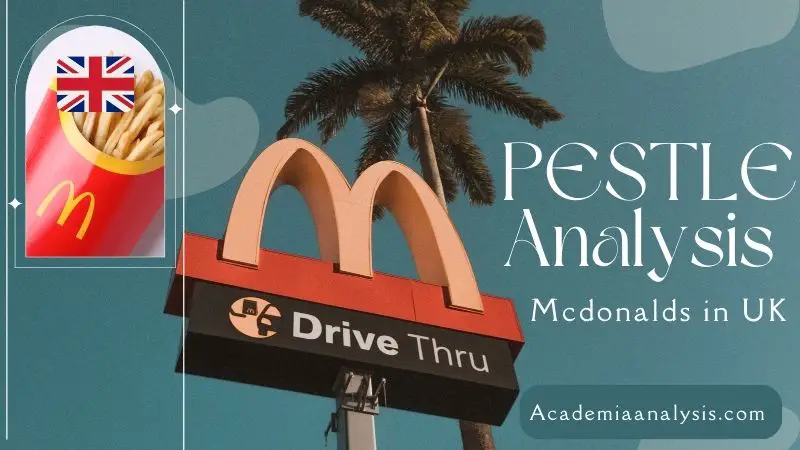Welcome to the vibrant world of McDonald’s in the United Kingdom, where exceptional taste, unparalleled convenience, and a touch of nostalgia combine to create a truly iconic dining experience. Since its arrival on British soil in 1974, McDonald’s has become an integral part of the nation’s cultural landscape, serving up smiles and satisfaction to millions of customers each day. Whether you’re craving a classic Big Mac, a delicious Filet-O-Fish, or a refreshing McFlurry, McDonald’s in the UK offers a diverse menu that caters to every appetite. Join us as we explore the rich history, mouthwatering offerings, and unwavering commitment to quality that have made McDonald’s a beloved household name across the United Kingdom.
Political Factors
As of my knowledge cutoff in September 2021, here are some political factors that can affect McDonald’s in the UK:
Government regulations: McDonald’s is subject to various regulations imposed by the UK government. These regulations may cover areas such as food safety, hygiene standards, labor laws, minimum wage requirements, advertising regulations, and environmental regulations. Changes in these regulations can impact McDonald’s operations, costs, and overall business practices.
Brexit: The UK’s decision to leave the European Union (Brexit) has significant implications for businesses operating in the country, including McDonald’s. Changes in trade agreements, tariffs, labor mobility, and supply chain disruptions could impact McDonald’s operations, sourcing, and profitability.
Taxation policies: Tax policies set by the UK government can have an impact on McDonald’s profitability. Changes in corporate tax rates, tax incentives, and tax avoidance regulations can influence the company’s financial performance and strategic decision-making.
Health and nutrition policies: The UK government has been actively promoting healthier eating habits and combatting obesity. Policies related to food labeling, marketing restrictions, and initiatives to reduce the consumption of unhealthy foods can affect McDonald’s product offerings, advertising strategies, and consumer perception.
Employment laws and labor rights: McDonald’s, being a major employer in the UK, is subject to labor laws and regulations. Changes in employment legislation, such as those related to working hours, employee benefits, minimum wage, and unionization, can impact the company’s labor costs and employee relations.
Political stability and public sentiment: Political stability in the UK can influence consumer confidence and spending patterns, which in turn affect McDonald’s sales. Public sentiment and attitudes toward fast food, international chains, and multinational corporations can also impact the company’s reputation and customer preferences.
It’s important to note that the political landscape can evolve, and new developments may have occurred since my knowledge cutoff date. Therefore, it’s advisable to refer to up-to-date sources and consult relevant stakeholders or experts for the most current information regarding McDonald’s and its political factors in the UK.
Economic Factors
McDonald’s, like any other multinational corporation, is influenced by various economic factors in the UK. Here are some key economic factors that can impact McDonald’s in the UK:
Economic Growth: The overall economic growth of the UK affects McDonald’s business performance. During periods of economic expansion, people tend to have more disposable income, leading to increased consumer spending on dining out and fast food, benefiting McDonald’s sales.
Inflation: Inflation rates can impact McDonald’s in terms of the cost of inputs, such as raw materials, labor, and utilities. Rising inflation may increase the company’s operating expenses, potentially leading to higher prices for consumers.
Exchange Rates: As a multinational company, McDonald’s operates in multiple currencies. Fluctuations in exchange rates between the British pound and other currencies can affect McDonald’s profitability. Exchange rate movements can impact import costs, as well as revenue generated from international sales.
Employment and Wages: McDonald’s is a major employer in the UK, and changes in labor market conditions can affect the company’s operations. Increases in the minimum wage or changes in labor regulations can impact labor costs and potentially affect McDonald’s profitability.
Consumer Confidence: Consumer confidence levels play a significant role in the success of McDonald’s in the UK. When consumers feel optimistic about the economy and their personal financial situation, they are more likely to spend on discretionary items like eating out. Conversely, during periods of low consumer confidence, people may cut back on dining out, affecting McDonald’s sales.
Competition: The competitive landscape in the fast food industry can impact McDonald’s market share and profitability. Economic factors, such as changes in consumer preferences, new entrants, or pricing strategies of competitors, can influence McDonald’s performance in the UK.
Government Policies and Regulations: Government policies and regulations related to taxation, health and safety, food labeling, and advertising can affect McDonald’s operations and costs. Changes in these policies may require adjustments in business practices, potentially impacting profitability.
It’s important to note that these factors are interconnected and can have both positive and negative impacts on McDonald’s in the UK. The company closely monitors these economic factors to make strategic decisions and adapt to changing market conditions.
Social Factors
McDonald’s, like any other multinational corporation, is influenced by various social factors in the UK. Here are some key social factors that impact McDonald’s in the UK:
Changing lifestyles: The UK has experienced a shift in lifestyle patterns over the years, with people leading busier lives and having less time for cooking. This has led to an increased reliance on fast food and quick-service restaurants like McDonald’s, which offer convenience and speed.
Health consciousness: In recent years, there has been a growing awareness and concern about health and nutrition in the UK. Consumers are becoming more conscious of their food choices and are seeking healthier options. As a result, McDonald’s has responded by introducing healthier menu items, such as salads, fruit options, and grilled chicken.
Cultural diversity: The UK is a culturally diverse country, with a significant number of immigrants and a variety of ethnic backgrounds. McDonald’s has recognized this diversity and adapted its menu to cater to different cultural preferences. For example, in addition to the standard menu items, McDonald’s in the UK offers vegetarian and halal options to accommodate different dietary requirements.
Ethical sourcing and sustainability: There is a growing demand for ethically sourced and sustainable food products in the UK. Consumers are increasingly concerned about issues such as animal welfare, environmental impact, and fair trade. McDonald’s has made efforts to address these concerns by implementing sustainable sourcing practices, supporting local farmers, and promoting responsible packaging and waste management.
Employment practices: McDonald’s is a major employer in the UK, providing jobs to a large number of people, including students, part-time workers, and individuals from disadvantaged backgrounds. The company’s employment practices, such as flexible working hours and training opportunities, can have a significant social impact by providing employment opportunities and contributing to local economies.
Community involvement: McDonald’s has established a presence in local communities across the UK. The company often engages in community initiatives, such as charity partnerships, sponsorships of local events, and educational programs. These efforts contribute to the social fabric of the communities in which McDonald’s operates.
It’s important to note that social factors can vary over time and may be influenced by broader societal trends and developments. McDonald’s continually adapts its strategies and offerings to align with evolving social expectations and preferences.
Technology Factors
Technology plays a crucial role in the operations of McDonald’s in the UK. Here are some of the technology factors that impact McDonald’s in the UK:
Self-Service Kiosks: McDonald’s has implemented self-service kiosks in many of its UK locations. These kiosks allow customers to place their orders and customize their meals using touch-screen interfaces. Self-service kiosks improve efficiency by reducing wait times and enable customers to have more control over their orders.
Mobile Ordering and Payment: McDonald’s offers mobile ordering and payment options through its mobile app. Customers can place their orders in advance, customize their meals, and pay through the app. This technology enhances convenience and speed of service, enabling customers to skip the traditional ordering process.
Digital Menu Boards: McDonald’s has replaced traditional static menu boards with dynamic digital menu boards in many of its UK restaurants. These digital boards can be easily updated to showcase promotions, limited-time offers, and menu changes. Digital menu boards provide flexibility and enable McDonald’s to promote new items more effectively.
Online Delivery Platforms: McDonald’s partners with various online food delivery platforms, such as Uber Eats, Just Eat, and Deliveroo, to offer delivery services. These platforms leverage technology to facilitate online ordering, real-time tracking, and efficient delivery, expanding McDonald’s reach and accessibility.
Drive-Thru Technology: Drive-thru is a significant channel for McDonald’s in the UK, and the company utilizes technology to enhance this experience. Features such as digital menu boards, order confirmation screens, and advanced drive-thru systems help streamline the ordering process, reduce errors, and improve overall efficiency.
Back-End Systems: McDonald’s relies on technology for its back-end operations, including inventory management, supply chain logistics, and employee scheduling. These systems help optimize operations, reduce waste, and ensure timely replenishment of ingredients.
Data Analytics: McDonald’s leverages data analytics to gain insights into customer preferences, purchasing patterns, and trends. This information helps inform menu development, marketing strategies, and operational decisions, ultimately enhancing the overall customer experience.
These technology factors contribute to McDonald’s ability to provide efficient service, convenience, and personalized experiences for its customers in the UK.
Legal Factors
Here are some potential legal factors that could impact McDonald’s in the UK:
Employment Law: McDonald’s must comply with employment laws and regulations in the UK, such as minimum wage requirements, working hour restrictions, health and safety regulations, and anti-discrimination laws.
Food Safety and Hygiene Regulations: McDonald’s must adhere to food safety and hygiene standards set by UK legislation. This includes maintaining proper food handling procedures, storage, preparation, and ensuring the cleanliness of their premises.
Advertising and Marketing Regulations: McDonald’s advertising and marketing activities in the UK are subject to laws and regulations, including those related to truthfulness, fairness, and appropriate targeting of children.
Intellectual Property Laws: McDonald’s needs to protect its trademarks, brand image, and intellectual property rights in the UK. It must respect and enforce trademark and copyright laws to prevent unauthorized use of its logos, slogans, and other intellectual property.
Consumer Protection Laws: McDonald’s is expected to comply with consumer protection laws in the UK. This includes providing accurate product information, ensuring product safety, and handling customer complaints and refunds appropriately.
Data Protection and Privacy Laws: McDonald’s must comply with data protection and privacy laws in the UK when handling customer data. This includes obtaining appropriate consent, ensuring data security, and providing individuals with rights regarding their personal information.
Environmental Regulations: McDonald’s is subject to environmental laws and regulations in the UK, such as waste management, recycling, and energy consumption. It may need to implement sustainable practices and meet specific environmental standards.
Franchising Laws: McDonald’s operates through a franchise model in the UK. Therefore, it must comply with franchise laws and regulations that govern the relationship between the franchisor (McDonald’s) and franchisees.
It’s worth noting that this list is not exhaustive, and there may be additional legal factors that could impact McDonald’s operations in the UK. Consulting with legal experts familiar with the specific regulations and requirements in the UK would be advisable for a comprehensive understanding of the legal landscape.
Environmental Factors
Environmental factors affecting McDonald’s in the UK can include:
Waste Management: McDonald’s generates a significant amount of waste, including food waste, packaging, and other materials. Environmental factors related to waste management include proper waste segregation, recycling initiatives, and reducing overall waste generation.
Energy Consumption: McDonald’s restaurants require energy for lighting, heating, cooling, and food preparation. Energy efficiency measures, such as installing energy-efficient appliances, LED lighting, and utilizing renewable energy sources, can help reduce environmental impact.
Water Usage: McDonald’s uses water for various purposes, such as food preparation, cleaning, and restroom facilities. Efficient water management practices, water-saving technologies, and promoting water conservation can contribute to reducing the company’s water footprint.
Sustainable Sourcing: McDonald’s relies on a vast supply chain to source ingredients for its menu items. Environmental factors related to sourcing include promoting sustainable agriculture practices, reducing deforestation, protecting biodiversity, and supporting responsible fishing practices.
Climate Change: McDonald’s operations contribute to greenhouse gas emissions through energy consumption, transportation, and waste management. Implementing carbon reduction strategies, adopting renewable energy sources, and optimizing logistics can help mitigate the company’s carbon footprint.
Packaging and Recycling: McDonald’s uses various types of packaging, including paper, plastic, and cardboard. Environmental factors related to packaging include using sustainable and recyclable materials, promoting recycling infrastructure, and reducing single-use plastics.
Green Building Design: Constructing and renovating McDonald’s restaurants with eco-friendly features, such as energy-efficient building materials, efficient HVAC systems, and green roofs, can contribute to reducing environmental impact.
Community Engagement: Engaging with local communities to promote environmental awareness, organizing clean-up initiatives, and supporting environmental organizations can foster positive environmental practices and improve McDonald’s image.
It’s important to note that McDonald’s has made efforts to address some of these environmental factors in recent years, such as setting sustainability goals and introducing initiatives like recycling programs and sustainable sourcing commitments. However, the effectiveness and extent of these efforts can vary, and ongoing monitoring and improvement are necessary to ensure a positive environmental impact.






